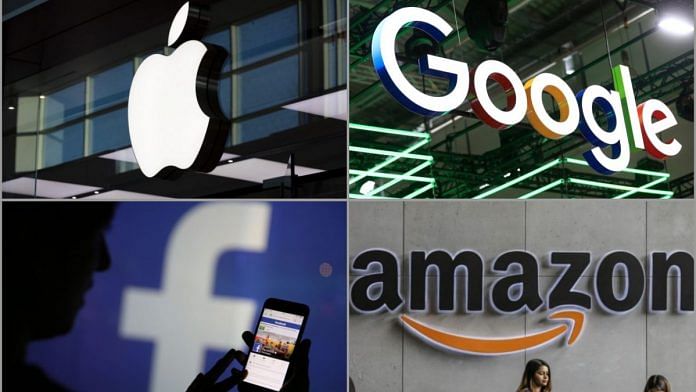NITIN PAI

The controversy over social media and Big Tech platforms banning US President Donald Trump and his supporters is not about free speech. It is about political power.
The right to free speech is only enforceable against the State. It is not enforceable against private entities — like private firms or individuals — however big or important they might be. It would have been a violation of the freedom of speech had an arm of the US government banned Donald Trump. Facebook, Twitter, Google, Apple and Amazon are private firms and are free to do whatever they please — provided it is not illegal — on their platform. Users who don’t like it have the freedom to leave the platform and head elsewhere. While we can have debate on the Big Tech companies’ wisdom and sense of judgement in banning Trump and de-platforming Parler, the pro-Trump social media network, we cannot deny them the right to do as they please on their private property.
At a time when “free speech” is kicked around as a partisan political football than a universal principle that a free society must uphold, it’s very important to emphasise that the right to free speech protects citizens from their government. Why so? Because unlike big media and Big Tech, the government has a monopoly over the legitimate use of force. You don’t want the person authorised to use the big stick to also be the one to determine what you can or cannot say. That is why liberal democracies, including our own, make fundamental rights enforceable by the citizen against the government. If the editors of ThePrint refuse to publish my article, they are not violating my right to free speech. If, however, the government censors my article, it violates my right. Let’s take it even further — if every publisher in the world refuses to publish my article, it is still not a violation of my right to free speech. There is no right to being heard.
The power of Big Tech
Making it about free speech distracts us from the real issue: the political power that social media and Big Tech platforms have. This is not new. Publishers and media companies have always had the ability to influence public opinion and political decisions. As Benedict Anderson argues, the advent of the printing press and availability of literature in vernacular languages led to the rise of nationalism and nation-States. In the pre-television era, Dileep Padgaonkar, the editor of The Times of India, was perhaps justified in boasting that he had the second-most important job in the country after the prime minister. Since the 1990s, we have seen the emergence of powerful television anchors, with the ability to shape public opinion. Newspaper barons were key players in the British politics of the 1980s. Rupert Murdoch’s media empire remains influential in more than one Western democracy. Before Twitter and Facebook, radio talk show programmes in the US served as the rallying point for both conservatives and liberals.
What distinguishes today’s social media platforms is their scale, their instantaneousness and their interactivity, which is unlike anything that came before them. They thus enjoy the power to allow narratives to strengthen and become powerful, and also the power to cut them out if they please. As Trump himself admitted, he would not be in the White House if not for Twitter. Now Twitter might have decimated his reach. As for tech platforms like Google, Apple and Amazon, their power lies in the ability to control access to these social networks. Once Google, Apple and Amazon decided to get Parler off their servers, it becomes extraordinarily difficult — but not impossible — for the latter to acquire the reach it enjoyed.
Free societies and concentration of power
Free societies should always be wary of the concentration of any kind of power in any kind of institution. So liberal democracies must worry about the power that Twitter, Facebook, Google and others have come to possess. Democracies other than the US have the additional challenge of contending with the fact that the shareholders, executives and permanent establishments of these companies are located outside their jurisdiction. The problem is: we have yet to evolve ways to govern trans-national technology and social media companies in a manner consistent with the rights of citizens and the interests of sovereign States.
As I wrote in a column a few months ago: “Democracies are trying to fit the problem into an anti-trust frame. They want to break up platforms citing the phone company analogy… The European Union, always trigger-happy on the antitrust front, is likely to embrace ex ante competition regulations. Politicians in India are both throwing many of our abundant laws and regulations at Big Tech and thinking up new ones. Everyone is grappling for answers. The paradox all democracies face is that it is impossible to check platform power without cutting into free speech and economic freedom that the former seek to protect and the latter actually provide.”
The Big Tech companies were right to use their power to take drastic action to reduce the risk of further violence and signal that mob attack on the US Congress would attract consequences. Yet, their continued failure to act to prevent or punish hate-driven violence in other countries exposes them to the charge of selectivity and opportunism. Their feet seem to have discovered the ability to kick the man only after he is down, their corporate consciences still subject to the exigencies of having to do business with whoever is in power. And now that they have used their power to de-platform individuals, how strong is their commitment to resist political pressures of various kinds to do the same to less exalted individuals?
Nitin Pai is the director of the Takshashila Institution, an independent centre for research and education in public policy. Views are personal.
No comments:
Post a Comment